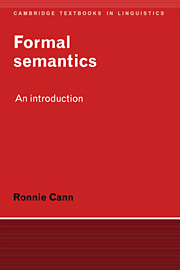Book contents
- Frontmatter
- Contents
- List of figures
- Preface
- List of symbols
- 1 INTRODUCTION
- 2 PREDICATES AND ARGUMENTS
- 3 NEGATION AND CO-ORDINATION
- 4 TYPE THEORY
- 5 THE LAMBDA OPERATOR
- 6 QUANTIFICATION
- 7 INFERENCE
- 8 TIME, TENSE AND ASPECT
- 9 POSSIBLE WORLDS
- 10 INTENSIONAL SEMANTICS
- Answers to selected exercises
- References
- Index
9 - POSSIBLE WORLDS
Published online by Cambridge University Press: 05 June 2012
- Frontmatter
- Contents
- List of figures
- Preface
- List of symbols
- 1 INTRODUCTION
- 2 PREDICATES AND ARGUMENTS
- 3 NEGATION AND CO-ORDINATION
- 4 TYPE THEORY
- 5 THE LAMBDA OPERATOR
- 6 QUANTIFICATION
- 7 INFERENCE
- 8 TIME, TENSE AND ASPECT
- 9 POSSIBLE WORLDS
- 10 INTENSIONAL SEMANTICS
- Answers to selected exercises
- References
- Index
Summary
Where entailments fail
In previous chapters (particularly Chapter 7), we looked at certain types of entailment relations that are guaranteed by the theory of interpretation set out in the earlier part of this book. Certain contexts exist, however, where expected entailments do not hold. Consider, for example, the inference pattern in (1).
a. The Morning Star is the planet Venus.
b. The Evening Star is the Morning Star.
c. Therefore, the Evening Star is the planet Venus.
The validity of this inference pattern illustrates a general rule that holds in the extensional semantic theory developed in Chapters 2 to 6 of this book. This rule is called Leibniz's Law or the Law of Substitution and it allows the substitution of extensionally equivalent expressions for one another in a formula while maintaining the truth value of the original formula. Thus, in (1), since the Morning Star and the Evening Star denote the same entity, the latter expression may be substituted for the former in the first premiss to give the conclusion. Indeed, because all three terms in (1) have the same extension all of them may be substituted for each other salva veritate (the Latin phrase used by Leibniz meaning ‘with truth unchanged’). The Law of Substitution can be formally defined as in (2) which, in words, says that if an expression a is extensionally equivalent to another expression b, then a formula φ is truth-conditionally equivalent to the formula formed from φ by substituting an instance of b for every instance of a.
- Type
- Chapter
- Information
- Formal SemanticsAn Introduction, pp. 263 - 281Publisher: Cambridge University PressPrint publication year: 1993



